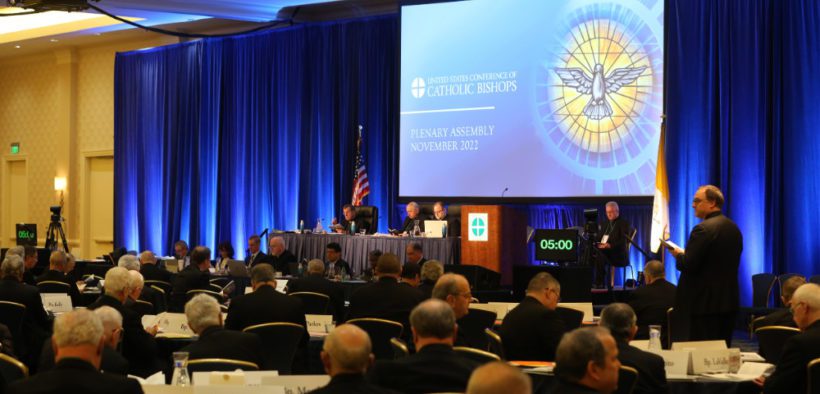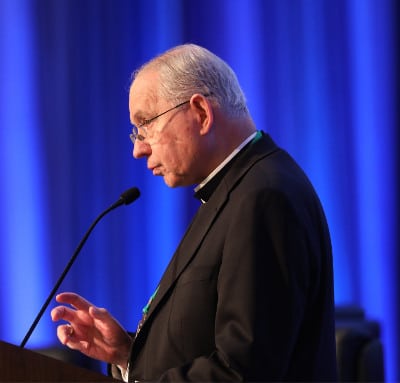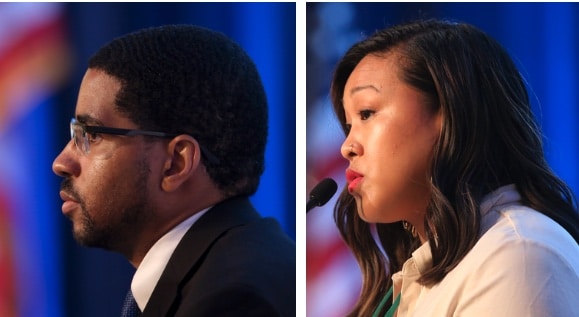Amid the highs and lows of the USCCB assembly, an unexpected lesson

Outgoing U.S. Conference of Catholic Bishops president Archbishop José H. Gomez of Los Angeles had a few good lines in his final address to that body, which contained a call to holiness, an observation that “we live in a noisy, distracted media culture” where “traditional norms and values are being tested,” and he made a plea for a Church unified through the Holy Eucharist, which “makes us one” to “raise up saints.”

Archbishop José H. Gomez of Los Angeles, president of the U.S. Conference of Catholic Bishops, gives his final presidential address Nov. 15, 2022, during a session of the fall general assembly of the bishops’ conference in Baltimore. (CNS photo/Bob Roller)
Those were not bad words at all, of course, but they’re also not very new words — or new thoughts. We Catholics have been hearing about “the call to holiness” since the Second Vatican Council, and yes, raising up saints is something that gets said, but in the nitty gritty work of formation, we seem to be struggling with exactly how we are to do that.
A recounting of the lives of Michelle Duppong, Cora Evans and Mother Margaret Mary Healy-Murphy, three women whose causes for sainthood were affirmed in the last hours of the November assembly, may instruct us, though. Apparently, the best way to raise up saints comes down to giving the Holy Spirit the openings and opportunity to work, especially through that noisy media, and by forming people to be open to its promptings.
Alright, admittedly, that’s more complex than it sounds. But, as Archbishop Gomez reminded us, “holiness has always been the hidden force in human history.”
Those are good words. They suggest energy and an acknowledgment that, as per his newly elected successor, Archbishop Timothy Broglio said in his interview with OSV News, “If you don’t invite people to excellence, then they’re going to dwell in the mediocre.”
Throughout the two days of public deliberation, “energy” — its appearance or lack thereof — and the words that rode upon it, were what kept intruding upon my awareness as I listened and watched. Archbishop Gomez has a rather understated mien, and he runs a sedate, if tidy, meeting. But overall, the energy of the gathered bishops seemed a tad low. There were a lot of familiar words and phrases, but perhaps that was a problem: too many familiar words. The work of “journeying together” is absolutely vital for Catholic Christians, particularly in an era of new challenges to centuries-old customs and norms — and, yet, little was said about the real accompaniment that “journeying together” requires, or what that even looks like. Thus, as with many of the words we heard, the idea seemed sterile, even stale; reduced to clerical jargon rather than having meaningful action behind them. I sometimes found myself interiorly urging our spiritual teachers to do more than speak words, but to actually say something.
There were stirring moments, of course. Certainly Archbishop Borys Gudziak, the Ukrainian Catholic archbishop of Philadelphia, raised the energy level in the room with his impassioned presentation on the war in Ukraine and denunciation of the “profound pathology of imperialism” by which that nation is threatened. Declaring that no one would tolerate a recolonization of the United States by the United Kingdom, and that “Blacks are never again going to be the subjects of Whites; so it is for us in Ukraine, it is liberty or death.”
As the saying goes, you could hear a pin drop. The bishops seemed spellbound. I was, too; my heart urged to prayer, my mind and soul utterly engaged.
But it was an uneven engagement as the meeting’s vigor waxed and waned. In fairness, that’s common to long conferences, but what struck me, repeatedly, was that the vivacity one would expect from a living Church only seemed to truly show itself when invited members of the laity rose to speak. And then, it surged.

Rudy Delaney and Cecelia Flores spoke during a Nov. 16, 2022, session of the fall general assembly of the U.S. Conference of Catholic Bishops in Baltimore.
There was real liveliness and evident joy amid frank expressions of frustration when two young adults, Rudy Delaney and Cecelia Flores, spoke to cultural diversity in the Church. As Dehaney brought up his love of the Gospel music so expressive to his African American heritage, and the dearth of it found within Catholic experience, I almost expected him to burst into song through the strength of his passion. Voicing gratitude for the attention of the bishops, Flores described the joy she has experienced through worship and church participation with other Catholics who are Hispanic or are of other ethnic heritages, and her hope that younger Catholics of diverse backgrounds and cultures can model the sort of community they hope to build within the Church. The room bounced.
A more solemn yet still powerful spark arose with the presentation of another layperson. Mark Joseph Williams, a survivor of sexual abuse by Catholic priests, and special adviser to Cardinal Joseph Tobin of the Newark archdiocese, spoke of the need for our bishops — indeed, for the whole Church — to do more to protect children and young adults from predators in positions of spiritual power and influence. Marking the 20th anniversary of the passing of the Dallas Charter with gratitude, he offered hopes that the work begun would continue, that the Charter would continue to evolve and “that you will keep an unwavering commitment to hear the voices of the victims, and the survivors in and out of the pew.”
Williams also seemed to gently call for a clear expression of contrition from Church leadership: “We must heed Jesus’ command, ‘love one another as I have loved you.’ I believe this means weeping to cleanse our sinful ways, as it has meant for me to rise from the abuse. …”
Following Williams’ assertion that the fruit of synodality “is realized through grace, especially out of suffering,” Cardinal Tobin reflected on what we had just heard. He spoke well, and if his own energy seemed low, one suspects it was out of respect for the gravity of all that is authentic and real about this ever-present wound to the Church.
I was struck by two things: first, by Tobin’s aspect of humility as he expressed gratitude for the witness of Williams and other victims, and also spoke about his own pain and sense of sorrow in the face of the 2018 McCarrick revelations and the grand jury report out of Pennsylvania — both of which hit Catholics like a one-two punch to the solar plexus and left us reeling in revulsion and grief; and second, by one phrase near the end of his reflection: “Listening to the Word of God, I hear shrieks of pain as a person names the torment and the tormentor. There have been meetings that showed me that I personally could do nothing for the person who just left my office.”
Well, I had to disagree, and I still do. The Archdiocese of Newark has created effective and helpful retreats for abuse victims, and that’s a very heartening institutional effort, but his expression of personal helplessness made me long to reach out in charitable correction — to say to a brother in Christ who should know better, but perhaps felt too humbled to personally cognizant of it, that “no, Cardinal, you can always ‘do something personally’ for the person before you, even if they tell you otherwise, even if they reject your help with both hands. You can always pray for them, and make sacrifice, and do penance for the sins of within the priesthood, and of the Church, both in public and in private.”
In all consolation, I wanted to remind the man — because beyond the office, he is still just a man — of what Jesus said when the apostles came to him with a difficult exorcism. Upon delivering the victim, he told his followers that “this kind can only come out by prayer” (Mk 9:29).
There is always something a bishop or any of us can do personally to address and try to heal the wounds that are still draining strength and vitality from the Body of Christ like a suckling demon. That might be my biggest takeaway from observing the bishops in action in the Year of Our Lord 2022.
Words matter. Through Christ Jesus, they offer “eternal life” (Jn 6:68). Life matters, and life is only possible when there is energy. The life of the Church must be full of zeal, with passionate ardor spent on behalf of our sisters and brothers, that all may be healed; that all may be one. As we “journey together” and proceed toward each other beneath the monstrance of the Living Christ, who makes all things new in Eucharistic Revival, may all of us, but especially our shepherds, called to teach, find the right words, the new words, the words that enliven what feels moribund, to reenergize the People of God.
Elizabeth Scalia is the culture editor for OSV News.
No comments:
Post a Comment